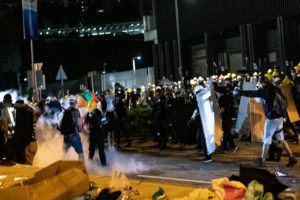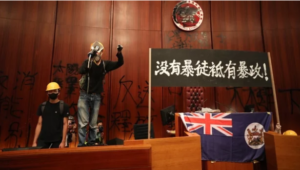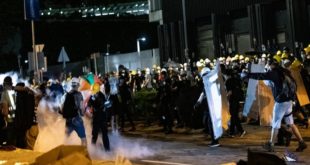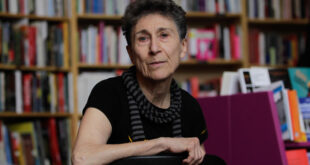by DEVI SACCHETTO
→ Italian
 We publish Devi Sacchetto’s interview with Michael Ma, activist of one of the most important organizations of students and teachers in Hong Kong, who fights against the practices of exploitation of workers put in place by the multinationals. Michael’s story is about a mobilization that is probably less radical ‒ from the point of view of its claims ‒ than the one of 2014, but that is still producing a mass and widespread politicization, and that is making use from the organizational point of view of what it learned from the repression that hit the movement five years ago. Chinese Kung-Fu star Bruce Lee’s phrase ‒ “Be like water. Be formless” ‒ perfectly describes a strategy of fluid mobilization, capable of adapting to contingencies, and which at the same time expresses a widespread diffidence towards the existing structures and their capacity to respond to the movement claims’. This strategy led, on July 1st, to an occupation of the Parliament which succeeded in blocking, at least temporarily, the process of approval of the extradition bill. Despite the specific social composition of this insurgency with its complex demand for democracy, the battle against the extradition law and against the Chinese government highlights the persistent tensions that crisscross the rearrangement of the post-colonial world, the difficulty of establishing sovereign and separate areas to guarantee without friction the rights of accumulation and State command.
We publish Devi Sacchetto’s interview with Michael Ma, activist of one of the most important organizations of students and teachers in Hong Kong, who fights against the practices of exploitation of workers put in place by the multinationals. Michael’s story is about a mobilization that is probably less radical ‒ from the point of view of its claims ‒ than the one of 2014, but that is still producing a mass and widespread politicization, and that is making use from the organizational point of view of what it learned from the repression that hit the movement five years ago. Chinese Kung-Fu star Bruce Lee’s phrase ‒ “Be like water. Be formless” ‒ perfectly describes a strategy of fluid mobilization, capable of adapting to contingencies, and which at the same time expresses a widespread diffidence towards the existing structures and their capacity to respond to the movement claims’. This strategy led, on July 1st, to an occupation of the Parliament which succeeded in blocking, at least temporarily, the process of approval of the extradition bill. Despite the specific social composition of this insurgency with its complex demand for democracy, the battle against the extradition law and against the Chinese government highlights the persistent tensions that crisscross the rearrangement of the post-colonial world, the difficulty of establishing sovereign and separate areas to guarantee without friction the rights of accumulation and State command.
***
The protests in HK are huge in number and extended over time. Can you tell us what is at stake in the extradition law and, consequently, what is the significance of the opposition so massive to this law?
The extradition bill in Hong Kong, as know as the Fugitive Offenders and Mutual Legal Assistance in Criminal Matters Legislation (Amendment) Bill 2019 is a proposed bill to allow the Hong Kong government to transfers fugitives to regions that do not have existing agreement with Hong Kong, including mainland China, Macau and Taiwan etc. The bill has triggered weeks of protests that include two marches that each involve over one million of people, which is over 1/7 of Hong Kong population. In my opinion, there are two mistrusts that triggered such a large scale movement: the mistrust of Chinese judicial system and the mistrust of Hong Kong government. In mainland China, the independence of the judicial system has been in doubt. Despite the successful criminal charging rate on court that is over 99%, force confessions and deprive of the arrestees’ right to meet lawyers are very frequently reported especially when the arrests were happened for activism reason. Also, the Residential Surveillance at a Designated Location (RSDL) which allows the Chinese government to detain arrestees in unknown location without any contacts to lawyers or family is well-known to be a tool for enforced disappearance against activists. Notably, the RSDL measures is an investigative measure which means arrestees under RSDL have not even went on court. Another mistrust is against the Hong Kong government. Without a universal suffrage on the Chief Executive, many believe that the Hong Kong government is not responsible to Hong Kong people. but the central government of China who control who to get the seat of the Chief Executive. Therefore, although the Hong Kong government has repeatedly expressed that the government will make sure all rights of the fugitives transferred are respected, it does gain the trust of most of the people who went on protest. In fact, in the case of “Causeway Bay Booksellers Disappearance”, the Hong Kong government has literally done nothing to protect the four booksellers who were taken away to mainland China extra-judicially in 2015.
Can you explain the composition of the movement?
According to my observation, most of the crowd, especially those who participated in occupying and surrounding, are local aged under 25. This group is mostly composed of students that have a balanced gender distribution. For those over 25, I would say many of these participants are closer to local educated middle class. This group is also the major source of votes to the «Pan-democratic parties» (the parties that anti-government’s regime) in the legislative council election in Hong Kong. In fact, many many speeches and publications from the protesters camp are hinting that those who support the bill are less-educated, less-intellectual, short-sighted and not «true Hong Kongers». From this you might also have a hit of how many protesters position themselves.
What is the role of NGOs, media, universities in protests?
The movement has been a highly decentralized one. Individual NGOs have been functioning in smaller scale to call for small actions and supports such as small assemblies among their fields, district screening of police’s brutal actions, emotions support for activists, materials storage, offering resting space etc. There have also been some professional groups such as journalists’ groups and medical profession groups who voiced out and disclosed the government or police’s violations that directly relate to their field. For example, a doctor group has held a press conference disclosing police’s abnormal assess to patients’ privacy for identifying patients who were injured due to the movement. These disclosures from different fields have played an important role to monitor the power of the government. For media, despite their regular reports on the movement, their cameras have also been an effective way to make police hesitate more to use excessive violence during conflicts. However, conflicts also happened between activists and journalists during at the front line. Due to previous mass arrest against activists in 2014 and 2016, many activists are very consciously wearing masks to avoid being recognized especially when they are at the front line of conflicts. They are therefore very sensitive to cameras that might be a source of footage for the government to identify them. For universities, I would say they are still very conservative. Despite the internal email from the HKUSPACE (a community college) stated that «I understand that when a government fails its people, people may think they have the rights to resort to rigorous means to ensure their voices are heard», none of the universities have clearly support the movement or expressed their disagreement on the government’s action.
And the role of the HK working class?
To be honest, I didn’t see a significant power from the solidarity of working class in this movement. Again, and sadly, most of the movement is composed by students and more educated middle class. The language of mobilizing is also not targeting a wider working class. The imagination of the movement is still very limited to «civil society against Chinese regime». Although there were trade unions calling for workers strikes to oppose the law, the number of participants are very limited. This is not a surprise given that the working class organizing foundation in Hong Kong has never been strong, to be honest.
Do migrant workers participate in this movement? What is their position? Is there fear of being deported?
I know there were some Chinese migrants who have been organizing themselves have participated in the movement. However, the participation of foreign domestic workers, ethnic minorities in gig economy or other migrant groups were not really observed. I would say the whole movement is a very local Hong Kong one. 99.9% of the mobilizing language has been targeting only to local HKers without a migrant concern.
Are the protests rooting, that is, are they bringing people together in some political groups?
The movement is very decentralized. The crowd, in general, has a mistrust of traditional political groups due to a believe that these groups have not really achieved anything in the past 30 years. Many believe that the groups are concerning about their seats in the council more than the movement itself. Therefore, although many political groups have been participating, they are not in a leading role in the movement at all.
What claims does this large movement take to the streets?
There have been 4 very clear demand from the crowd. 1. Complete Withdrawal of the Extradition Bill 2. Investigate the Police Force for Police Brutality 3. Total Recall of the 6.12 “Riot” Claim 4. Free and Drop Charges against Arrested Protesters.
Are there any requests relating to housing conditions in Hong Kong? And about labour conditions?
These requests were not shown in the protests, but many would believe that the housing problem is a long-term reason for youth’s anger in Hong Kong. For labour conditions, again and sadly, were never a focus in this movement, according to my observation.
What are the practices put in place by protesters? How protesters are organizing themselves? How do you defend yourself from the police attack? From an organizational point of view, did the 2014 events teach you different strategies?
Compared to 2014, the movement is really decentralized. This has allowed the activists to action in a far more flexible and bottoms up manner. Despite the two giant marches that were called by a traditional political platform, most of the other very frequent occupying, surrounding and other actions were called by crowd via the online forum «LIHKG» or dozens of telegram groups without significant leader. People discussed different ideas and strategies online with people they have never met and gathered at agreed spots to action. The actions can also be dismissed at any time if the crowd size is too small that the action might be risky. The telegrams groups also provide real-time maps to update the number and move of crowd and police during the scenes of conflicts by gathering reported information from the crowd. This has been very important for the decision making of the activists during conflicts. In the movement, the quote from Hong Kong kung fu star Bruce Lee «Be water my friend. Be formless». was very frequently quoted. I think the quote have very accurately pointed out a spirit of the movement.
What are the differences with the 2014 movement from political and organization point of view? What is the continuity/discontinuity? (composition, practices in the streets, organization…)
 I would say, in 2014 when the protesters were demanding for a universal suffrage, the movement’s aim was more aggressive. People was seeking for a better change of the political system. However, in the 2019 movement, it is more a defensive one. People are coming out demanding the government not to worsen the current legal system. The demand for a radical change in political system was not continued, so far (don’t forget the movement is still on-going). However, we can see that the mobilizing and practical working abilities of people have been accumulated a lot since 2014. I would say this is a key of the success of the decentralized activism model. It is observed that people without significant political background have been functioning in different roles in a very mature manner. People self-coordinated and worked very well from backup to the front line. For example, the listing, purchasing, storing, transporting and using of the materials and equipment were all so well functioned by groups of people who never know each other before. Similar situation also happens when people do giant amount of decentralized works like promotion, small actions and off-line discussions. These people are also not regular activists that are working contently in the field but are truly from everywhere from the society. This well-understanding of the need of movement and the trust between activists are for sure a result of the accumulation from 2014.
I would say, in 2014 when the protesters were demanding for a universal suffrage, the movement’s aim was more aggressive. People was seeking for a better change of the political system. However, in the 2019 movement, it is more a defensive one. People are coming out demanding the government not to worsen the current legal system. The demand for a radical change in political system was not continued, so far (don’t forget the movement is still on-going). However, we can see that the mobilizing and practical working abilities of people have been accumulated a lot since 2014. I would say this is a key of the success of the decentralized activism model. It is observed that people without significant political background have been functioning in different roles in a very mature manner. People self-coordinated and worked very well from backup to the front line. For example, the listing, purchasing, storing, transporting and using of the materials and equipment were all so well functioned by groups of people who never know each other before. Similar situation also happens when people do giant amount of decentralized works like promotion, small actions and off-line discussions. These people are also not regular activists that are working contently in the field but are truly from everywhere from the society. This well-understanding of the need of movement and the trust between activists are for sure a result of the accumulation from 2014.
Is this movement more politicized than in 2014?
No and yes. No in terms of the lack of a significant demand of a fundamental and radical political change as discussed above (no need to mention the absent of significant demand regarding class politics). Yes, in terms of people’s consciousness on the nature of police as a state machine, the lack of Independence of the Hong Kong government. Also when people have to engage in intensive strategic discussion (due to the decentralized model that leaders are absent), people have a lot more opportunities to critically review the strategies of the movement, the relations between activists and other citizens etc. I think this is going to be a very important accumulation for the future movement as well.
What does the demand for democracy mean?
It is a very complicated question. Many people in the movement have very different view. Some may understand it as a better political system to represent local Hong Kongers’ interest, some may understand it as a move to get closer to «civilized western system», some may believe democracy is the key difference between Hong Kong and China. For myself and many of my friends, we believe that the demand for democracy is far beyond an electoral system. It means a conceptual and practical equality among people with different ability, resources and nationality. It is also about the consciousness of people being responsible for our own well-being instead of the multinationals or governments doing so. I have to stress again, this will never be done by an election system, especially one that intended to exclude stakeholders that have no right to vote because of their identity on passports.
What is behind the demand for autonomy from China?
This is another very complicated question. For myself and my friends, it means a relatively free and safe space for internationalist activists understand and work on Chinese working class issues. It is also a space to support and backup labour activists and other activists in China as well as allowing the discourses against the Chinese government’s policies that is getting closer to capitalism.
What does it mean that many claim is a leaderless movement? Have you many leaders or not leaders at all? Is it a strategy to avoid repression?
I understand this as a situation that no one in the movement controls the direction of the movement according to his/her/their own will. There might have «leaders» playing a leading role in different random actions but it is very clear that their legitimacy to lead is really depending on how close their guidance to the thought of the crowd. As most of the crowd are not attached to any political organizations, they have no obligation to follow any specific leaders or entities. If the small actions do not fit people’s imagination of movement, it immediately loses the crowd, vice versa. I believe that this is on one hand because of the mistrust of the traditional political leaders, and on the other hand a way for the most aggressive activists to protect themselves from being easily identified as a target to crack down.
How are these protests seen in mainland China? Is there direct or indirect support?
First of all, I have to be very honest that most of the information about the movement is censored by the great firewall so majority of the people in mainland do not really know about it. For those who are in the activism field, especially those who noticed former support to mainland activism from Hong Kong, they are very supportive. Many of them said something like «please preserve the last piece of land in China with freedom». Although there are not much they can actually do to support, it does show a cross-boarder solidarity, which is very important when many of the languages in the movement are hinting a total isolation between mainland China and Hong Kong.
 ∫connessioniprecarie connettere gli ∫connessi, produrre comunicazione
∫connessioniprecarie connettere gli ∫connessi, produrre comunicazione




